Plot
This article needs a plot summary.(December 2023) |
| Love in the Desert | |
|---|---|
| Directed by | George Melford |
| Written by | |
| Starring | |
| Cinematography | Paul P. Perry |
| Edited by | Mildred Richter |
Production company | |
| Distributed by | Film Booking Offices of America |
Release date |
|
Running time | 7 Reels |
| Country | United States |
| Languages | Sound (Part-Talkie) English Intertitles |
Love in the Desert is a 1929 American sound part-talkie drama film directed by George Melford and starring Olive Borden, Hugh Trevor, and Noah Beery. [1] In addition to sequences with audible dialogue or talking sequences, the film features a synchronized musical score and sound effects along with English intertitles. The soundtrack was recorded using the RCA Photophone sound-on-film system. [2]
This article needs a plot summary.(December 2023) |
Prints of Love in the Desert survive in Cineteca Del Friuli (Gemona) and Centre national du cinéma et de l'image animée (Fort de Bois-d'Arcy). [3]

The Dove is a 1927 American silent romantic drama film directed by Roland West based on a 1925 Broadway play by Willard Mack and starring Norma Talmadge, Noah Beery, and Gilbert Roland.

Noah Nicholas Beery was an American actor who appeared in films from 1913 until his death in 1946. He was the older brother of Academy Award-winning actor Wallace Beery as well as the father of prominent character actor Noah Beery Jr. He was billed as either Noah Beery or Noah Beery Sr. depending upon the film.
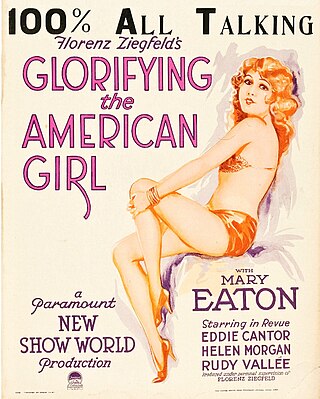
Glorifying the American Girl is a 1929 American pre-Code musical comedy film produced by Florenz Ziegfeld that highlights Ziegfeld Follies performers. The last third of the film, which was filmed in early Technicolor, is basically a Follies production, with appearances by Rudy Vallee, Helen Morgan, and Eddie Cantor.

The Godless Girl is a 1928 American sound part-talkie dramatic directed by Cecil B. DeMille. In addition to sequences with audible dialogue or talking sequences, the film features a synchronized musical score and sound effects along with English intertitles. The soundtrack was recorded using the RCA Photophone sound-on-film system. The cast features Lina Basquette, Marie Prevost, Tom Keene, and Noah Beery.

To the Last Man is a 1923 American silent Western film based on the 1921 novel by Zane Grey, produced by Adolph Zukor and Jesse L. Lasky from Famous Players–Lasky, distributed by Paramount Pictures, directed by Victor Fleming, and starring Richard Dix, Lois Wilson, and Noah Beery. The cinematographer was James Wong Howe.

The Show of Shows is a 1929 American pre-Code musical revue film directed by John G. Adolfi and distributed by Warner Bros. The all-talking Vitaphone production cost almost $800,000 and was shot almost entirely in Technicolor.

Chinatown Nights, also known as Tong War, is a 1929 film starring Wallace Beery and begun as a silent film then finished as an all-talking sound one via dubbing. Directed by William A. Wellman and released by Paramount Pictures, Chinatown Nights also stars Florence Vidor, former wife of director King Vidor, who did not dub her own voice and quit the movie business immediately afterward, preferring not to work in sound films; her voice in Chinatown Nights was supplied by actress Nella Walker. The supporting cast includes Warner Oland as a Chinese gangster and Jack Oakie as a stuttering reporter. The movie was based upon the story "Tong War" by Samuel Ornitz.
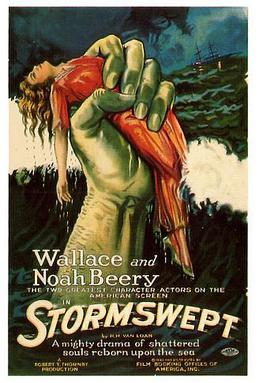
Stormswept is a 1923 silent film starring brothers Wallace Beery and Noah Beery. The advertising phrase used for the movie was "Wallace and Noah Beery, The Two Greatest Character Actors on the American Screen." The film was written by Winifred Dunn from the H. H. Van Loan story, and directed by Robert Thornby. A print of the film survives in London's BFI National Archive.
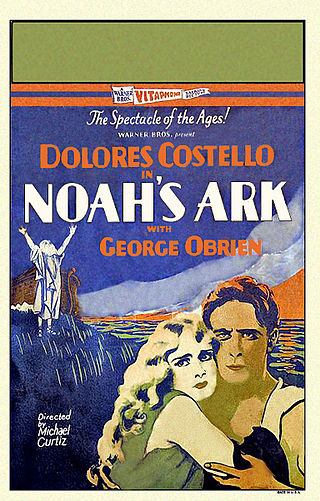
Noah's Ark is a 1928 American part-talkie epic disaster film directed by Michael Curtiz and starring Dolores Costello and George O'Brien. In addition to sequences with audible dialogue or talking sequences, the film features a synchronized musical score and sound effects along with English intertitles. The soundtrack was recorded using the Vitaphone sound-on-disc system. The story is by Darryl F. Zanuck. The film was released by the Warner Bros. studio. Most scenes are silent with a synchronized music score and sound effects, in particular the biblical ones, while some scenes have dialogue.

Song of the Flame is a 1930 American pre-Code musical film photographed entirely in Technicolor. Based on the 1925 operetta of the same name, the film features a screenplay by Gordon Rigby adapted from the musical book written by Oscar Hammerstein II and Otto A. Harbach for the operetta. The movie also features many of the songs from the operetta which used lyrics by Hammerstein and Orbach and music by George Gershwin and Herbert Stothart. The film was produced and distributed by First National Pictures. It was the first color film to feature a widescreen sequence, using a process called Vitascope, the trademark name for Warner Bros.' widescreen process. The film, based on the 1925 Broadway musical of the same name, was nominated for an Academy Award for Sound Recording. It is part of the tradition of operetta films, popular at the time.

Bright Lights, later retitled Adventures in Africa, is a 1930 American pre-Code musical comedy film produced and released by First National Pictures, a subsidiary of Warner Bros. It premiered in Los Angeles in July 1930 but was edited and rereleased in early 1931. Although it was photographed entirely in Technicolor, the only surviving print is in black and white. The film stars Dorothy Mackaill, Frank Fay, Noah Beery and Frank McHugh. It also features the screen debut of John Carradine, who appears in a small, uncredited role.

The Garden of Allah is a 1927 American silent romantic drama film directed by Rex Ingram, his final film for Metro-Goldwyn-Mayer. The film stars Ingram’s wife, actress Alice Terry and Iván Petrovich. Due to the public's apathy towards silent films, a sound version was prepared and released in 1928. While the sound version has no audible dialog, it features a synchronized musical score with sound effects. The film was released in both sound-on-disc and sound-on-film formats.

Sunset Pass is a 1933 American pre-Code Western film directed by Henry Hathaway and starring Randolph Scott, Tom Keene, Harry Carey, and Noah Beery. The picture was based on a Zane Grey novel, along with several other theatrical films with similar casts also based upon Zane Grey novels directed by Hathaway in 1933.
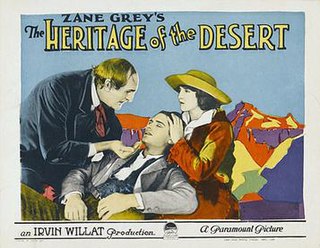
The Heritage of the Desert is a 1924 American silent Western film directed by Irvin Willat and based on the novel of the same name by Zane Grey. It stars Bebe Daniels, Ernest Torrence, and Noah Beery. The film was released by Paramount Pictures with sequences filmed in an early Technicolor process.
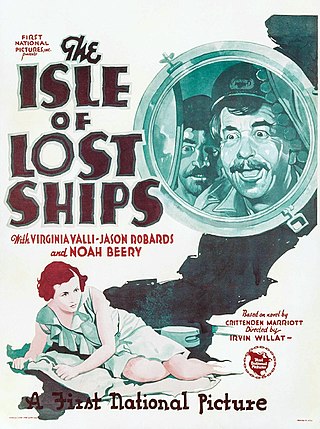
The Isle of Lost Ships is an all-talking 1929 sound film. The picture was produced by Richard A. Rowland and distributed by Warner Bros. Irvin Willat was the director with Jason Robards Sr., Virginia Valli and Noah Beery Sr. in the leads. It is based on the 1909 novel The Isle of Dead Ships by Crittenden Marriott, and is also a remake of Maurice Tourneur's now lost 1923 classic of the same name. A mute copy of this film is preserved at the Library of Congress. The Vitaphone discs which contain the soundtrack to the film are currently lost. An almost complete copy of the sound version of the film survives at the Eye Filmmuseum archive with an estimated running time of 55:58.

Careers is a 1929 American all-talking pre-Code drama film directed by John Francis Dillon and produced and released by First National Pictures. It stars Billie Dove and features Antonio Moreno, Thelma Todd and Noah Beery. The film was based on a 1924 German play entitled Karriere, written by Alfred Schirokauer and Paul Rosenhayn.

Dance Hall is a 1929 American pre-Code musical film directed by Melville Brown and written by Jane Murfin and J. Walter Ruben, based on the short story of the same name by Vina Delmar. The film centers a love triangle with a shipping clerk competing with a dashing aviator for the affections of a young taxi dancer. It was Radio Pictures' second to last release of the decade, and was a critical and financial flop.

Hugh Trevor was an American actor whose short career began at the very end of the silent era in 1927. He would appear in nineteen films in the scant six years during which he was active. He did not fare well with the advent of talking pictures, and retired from the industry in 1931. His life was cut short when he unexpectedly died from complications following appendectomy surgery in 1933.
Linda is a 1929 American sound drama film directed by Dorothy Davenport. While the film has no audible dialog, it was released with a synchronized musical score with sound effects using both the sound-on-disc and sound-on-film process.

If the Gods Laugh is a 1925 romantic adventure novel by the British writer and explorer Rosita Forbes. It is set against the backdrop of the Italian colonization of Libya.